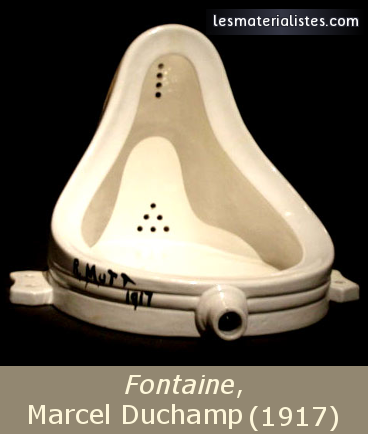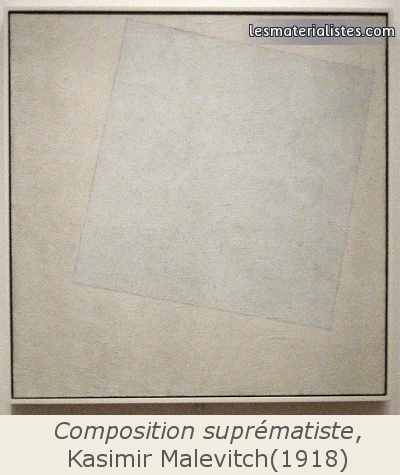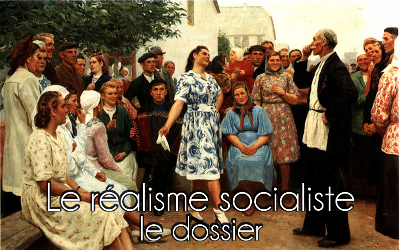The hundred years of Marcel Duchamp's “fountain”
Submitted by minus Hundred years ago, Marcel Duchamp opened symbolically a whole new epoch. It was the end, on the side of the bourgeoisie, of any pretension of rationalism, objectivity, of objectivism in the sense of the representation of an object.
Hundred years ago, Marcel Duchamp opened symbolically a whole new epoch. It was the end, on the side of the bourgeoisie, of any pretension of rationalism, objectivity, of objectivism in the sense of the representation of an object.
Alongside the tremendous raise of the productive forces, the bourgeoisie definitely dropped any sense of realism, universalism, collectivism, as those values were now the substance of a strong working class.
Any aesthetic pretension was abandoned, with also the ability of producing any avant-garde opening new paths. Modern art ceases to exist, contemporary art affirming itself as the cult of the individual spirit and the negation of the representation of reality.
The French Marcel Duchamp, in presenting on the 10th of April 1917, hundred years ago, a porcelain urinal as a “fountain” at the exhibition of the Society of Independent Artists at The Grand Central Palace in New York, raised symbolically the flag of subjectivism.
One year later, Kazimir Malevich hailed this tendency of negation of reality, through his Suprematist Composition: White on White, overtaking the work already began by painters like Claude Monet, Paul Cézanne, Vincent Van Gogh Amadeo Modigliani or Pablo Picasso.
Once opened, the door of subjectivism was never closed.
John Cage, in 1952, produced a “musical” work called 4′33″, with not any sound except the one of the listeners during the performance. Samuel Beckett, in 1953, published the play Waiting for Godot, where people expresses absurd behaviours and talkings, as “proof” of the vacuity of life, the absence of any sense of living.
This trend belongs to the nature itself of the decadent bourgeoisie and it exists at all level : sculpture, architecture, mathematics, economics, music, etc.
In the field of sciences, only the massive huge of statistics and probabilities permitted not to fall totally in the superstitious belief of chaos, fortuity, random changes, merely individual choices.
 The bourgeoisie went so far in this expression of nihilism, that it produced the ideology of “deconstruction”, raising the flag of ultra-subjectivism.
The bourgeoisie went so far in this expression of nihilism, that it produced the ideology of “deconstruction”, raising the flag of ultra-subjectivism.
This is the ideology of prostitutes presented as “sex workers”, the theory of gender of LGBTQ+ with its infinity of definitions (pansexual, polysexual, queer, aromantic, transsexual, intersex, bigender, etc.).
This is the will of negating the existence of man and woman as natural reality, of the couple as normal relationship, of identity as “spiritual” choice, developing ethno-diffentialist topics, rejecting the principle of capitalist exploitation and class struggles in favor the individual affirmation against “oppressions”.
And we can see that most of the historical left has been trapped in this ultra-capitalist ideology.
The lack of knowledge of dialectical materialism, a cosmopolitan style of work, the submission to petty-bourgeois radical trends, all this brought the massive success of the post-modernist theses.
This is notably true in the area of Trotskyist, Marxist-Leninist, fake “Maoists” organizations around the world, which broke up entirely with the historical tradition of the working class, of the Communist movement.
Here, we can see that ultra-left tendencies are in convergence with the modernization of capitalism.
On the contrary, genuine Communists defend socialist realism, the national democratic heritage, the principle of production mode, refusing the separation of body and mind.
And it is necessary to understood here that a large part of the masses is trapped in the appearance of post-modernism : without correct ideological and cultural tools, the masses believe that post-modernism is really what it means, to be at the left, being either in favor it or falling in the reactionary answer of conservatism and fascism.
 In France, we can see this in the campaign of the presidential elections, with post-modernist candidates (Emmanuel Macron, Benoît Hamon, Philippe Poutou, and also Nathalie Arthaud more and more) and nationalist candidates the “good” capitalism (Marine Le Pen, Nicolas, Dupont-Aignan, Jean Lassalle, François Asselineau, François Fillon, Jacques Cheminade), Jean-Luc Mélenchon being at the crossroads of both.
In France, we can see this in the campaign of the presidential elections, with post-modernist candidates (Emmanuel Macron, Benoît Hamon, Philippe Poutou, and also Nathalie Arthaud more and more) and nationalist candidates the “good” capitalism (Marine Le Pen, Nicolas, Dupont-Aignan, Jean Lassalle, François Asselineau, François Fillon, Jacques Cheminade), Jean-Luc Mélenchon being at the crossroads of both.
This explains the really difficult political situation in France, but show also that there is a path : the one of people's democracy, in the refusal of both post-modernism and ultra-conservatism, which are two sides of the same coin.
